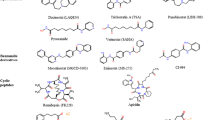Summary
This study investigated the inhibitory effects of curcumin on proliferation of hematological malignant cells in vitro and the anti-tumor mechanism at histone acetylation/histone deacetylation levels. The effects of curcumin and histone deacetylase inhibitor trichostatin A (TSA) on the growth of Raji cells were tested by MTT assay. The expression of acetylated histone-3 (H3) in Raji, HL60 and K562 cells, and peripheral blood mononuclear cells (PBMCs) treated with curcumin or TSA was detected by immunohistochemistry and FACS. The results showed curcumin inhibited proliferation of Raji cells significantly in a time- and dose-dependent fashion, while exhibited low toxicity in PBMCs. Curcumin induced up-regulation of the expression of acetylated H3 dose-dependently in all malignant cell lines tested. In conclusion, curcumin inhibited proliferation of Raji cells selectively, enhanced the level of acetylated (H3) in Raji, HL60, and K562 cells, which acted as a histone deacetylase inhibitor like TSA. Furthermore, up-regulation of H3 acetylation may play an important role in regulating the proliferation of Raji cells.
Similar content being viewed by others
References
Ding ZS, Gao CX, Chen NB, et al. Effects of curcumin: antiangiogenesis and induction of SMMC-7721 cell apoptosis. Chin Pharmacol Bulletin (Chinese), 2003,19(2):171–173
Cress WD, Seto E. Histone deacetylase transcription control, and cancer. J Cell Physiol, 2000,184:1–16
Sasakawa Y, Naoe Y, Inoue T, et al. Effects of FK228, a novel histone deacetylase inhibitor, on human lymphoma U-937 cells in vitro and in vivo. Biochem Pharmacol, 2002,64(7):1079–1090
Piekarz RL, Robey R, Sandor V, et al. Inhibitors of histone deacetylation, depsipeptide (FR901228), in the treatment of peripheral and cutaneous T-cell lymphoma: a case in report. Blood, 2001,98:2865–2868
Chen WJ, Chen Y, Wu YD, et al. Effect of curcumin on expression of cell cycle related proteins in HL-60 cell line. J Clin Hematol (Chinese), 2001,14(5):215–217
Gui CY, Ngo L, Xu WS, et al. Histone deacetylase (HDAC) inhibitor activation of p21WAF1 involves changes in promoter-associated proteins, including HDAC1. Proc Natl Acad Sci U S A, 2004,101(5):1241–1246
Han SS, Chung ST, Robertson DA, et al. Curcumin causes the growth arrest and apoptosis of B cell lymphoma by downregulation of egr-1, C-myc, Bcl-xl, NF-κB and P53. Clin Immunol, 1999,93(2):152–161
Aggarwal BB, Kumar A, Bharti AC, et al. Anticancer potential of curcumin: preclinical and clinical studies. Anticancer Res, 2003,23(1A):363–398
Finnin MS, Donigian JR, Cohen A, et al. Structures of a histone deacetylase homologue bound to the TSA and SAHA inhibitors. Nature, 1999,401(6749):188–193
Zhou Q, Melkoumian ZK, Lucktong A. Rapid induction of histone hyperacetylation and cellular differentiation in human breast tumor cell lines following degradation of histone deacetylase-1. J Biol Chem, 2000,275(45):35 256–35 263
Liu HL, Chen Y, Cui GH, et al. Curcumin, a potent anti-tumor reagent, is a novel histone deacetylase inhibitor regulating B-NHL cell line Raji proliferation. Acta Pharmacol Sin, 2005,26(5):603–609
Author information
Authors and Affiliations
Additional information
This project was supported by a grant from the National Natural Sciences Foundation of China (No. 30271672).
Rights and permissions
About this article
Cite this article
Hu, J., Wang, Y. & Chen, Y. Curcumin-induced histone acetylation in malignant hematologic cells. J. Huazhong Univ. Sci. Technol. [Med. Sci.] 29, 25–28 (2009). https://doi.org/10.1007/s11596-009-0105-5
Received:
Published:
Issue Date:
DOI: https://doi.org/10.1007/s11596-009-0105-5




